Communication
The Latest Developments & Updates
Find more news on communication-related issues important for the Dutch LSH sector. Ranging from expansion of the Top Sector LSH and important publications.
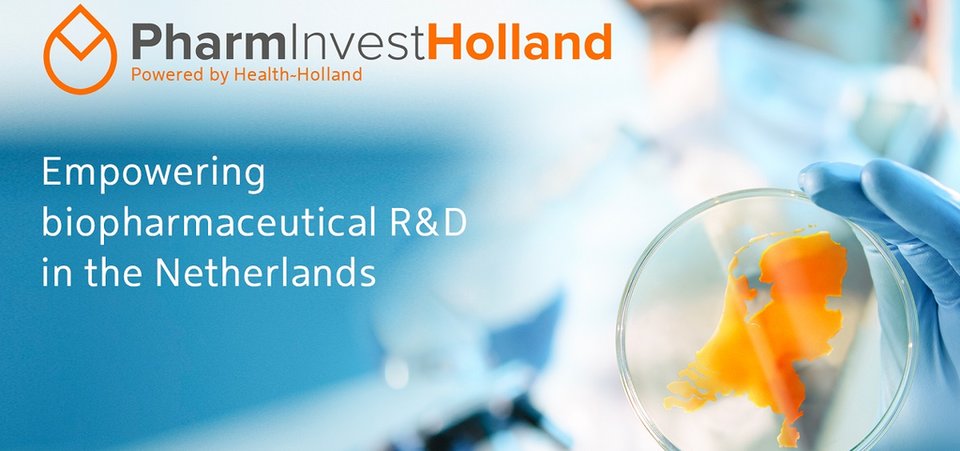
New publication on
the Dutch biopharmaceutical industry
Read more ›
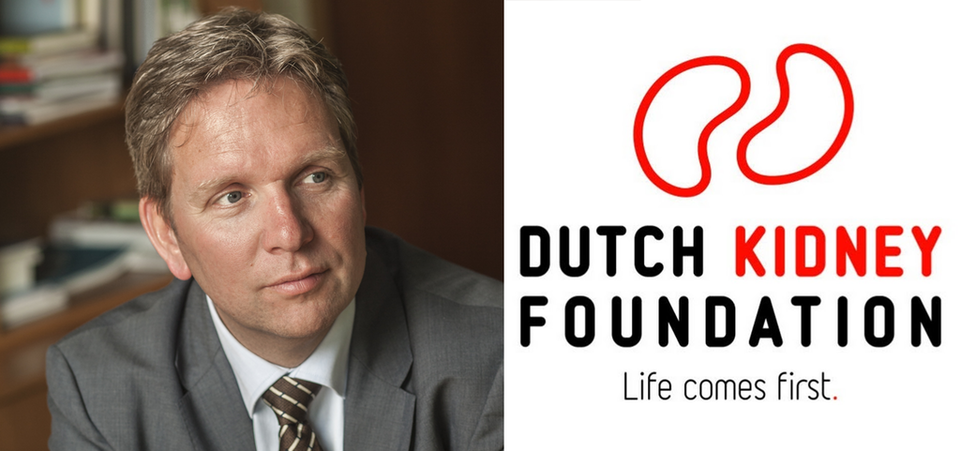
Director of Dutch Kidney Foundation elected as most influential person in philanthropy
Read more ›

LSP raises record €750M in 10 months for life sciences innovations
Read more ›
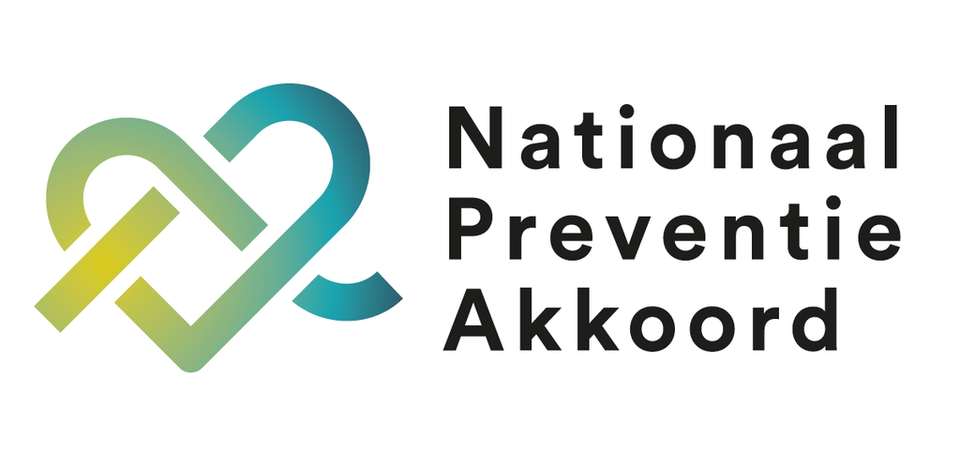
National Prevention Agreement improves the health of Dutch citizens
Read more ›
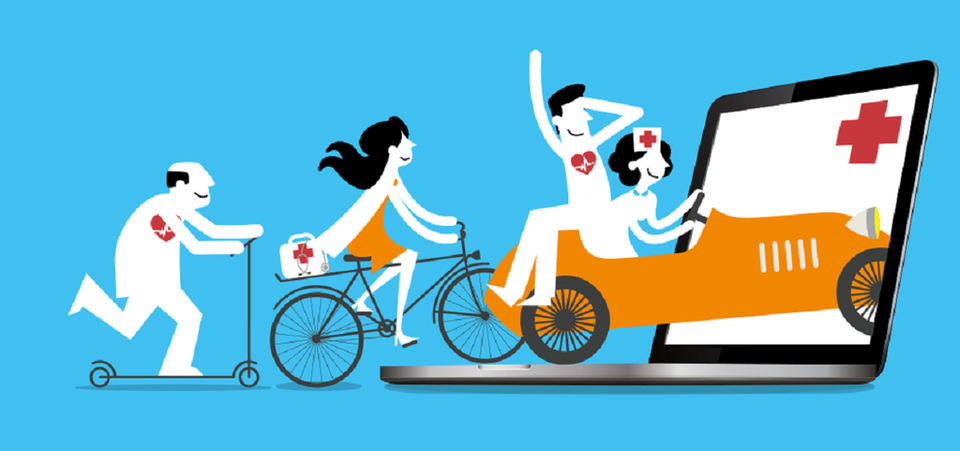
New eHealth Monitor published by Nictiz and Nivel
Read more ›
New publication of bid book on the Dutch biopharmaceutical industry
On 15 November the renewed bid book on the Dutch biopharmaceutical industry was shared with members of the Dutch House of Representatives, life sciences entrepreneurs, the Ministry of Economic Affairs and Climate Policy and the Ministry of Health, Welfare and Sport. It is now also online available for everybody who wants to read about the advantages of setting up your business in the Netherlands. It demonstrates all the reasons why the Netherlands is a top location for pharmaceutical operations. Get inspired and let’s spread the word together.
Read the bid book by clicking on the cover below:
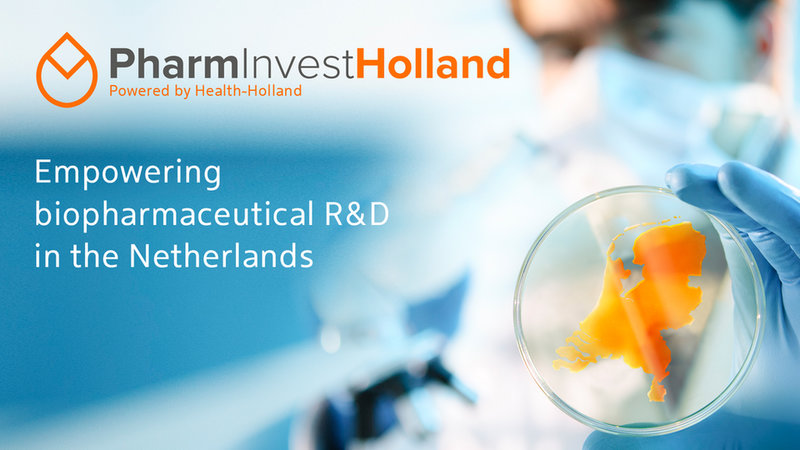
National Prevention Agreement improves the health of Dutch citizens
In the national prevention agreement, more than 70 parties joined to make the Netherlands healthier and reduce health inequalities. The agreement consists of an extensive package of targets and measures for the reduction of smoking, obesity and alcohol abuse. With unified powers, the participants wish to achieve a smoke-free generation in 2040, the prevention of alcohol use among the youth and pregnant women, a greater awareness of the risks or alcohol and a decrease in obesity among citizens instead of an increase. On behalf of the Dutch government, state secretary Blokhuis of the Ministry of Health, Welfare and Sport, sent the National Prevention Agreement to the Dutch House of Representatives.
High urgency
State Secretary Blokhuis: “Smoking, obesity and alcohol abuse cause major health problems for many people. On a yearly basis, approximately 20,000 Dutch citizens die because of the effects of smoking. Obesity is without a doubt the second most important cause of cardiovascular diseases and even 40% of diabetes type 2 patients. Each year, alcohol causes about 3,000 cases of cancer and is the main supplier of addiction care. So there is a high urgency. That is why we come into action together with the National Prevention Agreement, which is on top of the good initiatives that already exist. I am incredibly proud of the constructive way all the parties involved collaborate. We can make a stand for a healthier Netherlands.’’
The start of a movement
RIVM’s first analysis proved that the measurements of the National Prevention Agreement have a positive effect on reducing smoking, obesity and alcohol abuse and consequently on the health of all Dutch citizens. However, the high ambitions of the agreement with this package of measurements will not be achieved within the timeframe set. A smoking free generation in 2040 might be possible with the current measures and is, according to RIVM, feasible if additional measures are taken for young people and pregnant women. In the area of obesity and alcohol abuse, RIVM notes that the high ambitions – like reversing the trend towards obesity – requires stricter measurements. Based on this analysis, the parties involved concluded that with the National Prevention Agreement, the most important step towards the desired goal has been set. It is the start of a movement. For further steps, support from society is required. The high ambitions will be preserved by and for all stakeholders.
More than 70 parties involved
With the National Prevention Agreement more than 70 societal organisations, companies, branch organisations, patient organisations, care providers, health insurers, municipalities, foundations, sports federations, education institutes and the government work together on a broad movement that makes the Netherlands healthier and more vital.
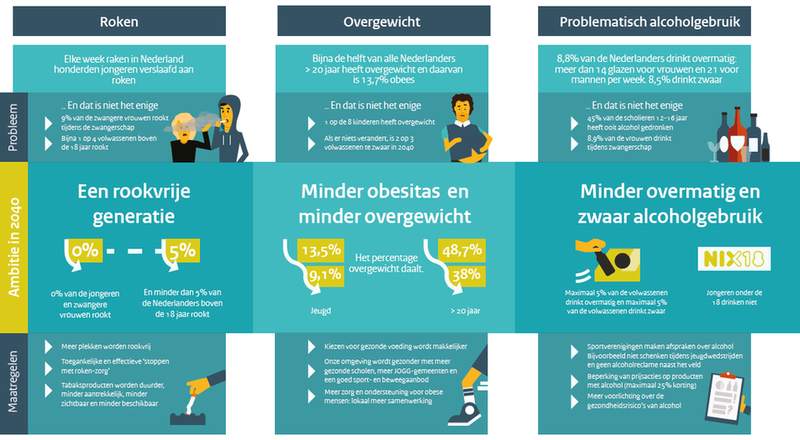
Director of Dutch Kidney Foundation, Tom Oostrom, elected as most influential person in philanthropy
Tom Oostrom, director of the Dutch Kidney Foundation, has been elected ‘most influential person in Dutch philanthropy’ by the news magazine De Dikke Blauwe. He therefore takes over the number 1 position in De Dikke Blauwe top 100 from Laurentien van Oranje, who finished on top of the list last year. The jury praises Oostrom for his proactive entrepreneurship and innovation ability. Under his leadership, the Dutch Kidney Foundation has been transformed from a traditional charity foundation to a societal enterprise with a clear ambition: curing kidney diseases.
Tom Oostrom: “It is a great appreciation for the things we as the Dutch Kidney Foundation, our volunteers, patients, donators and everyone who supports our mission achieve. A recognition for the course we are sailing. Relevance and entrepreneurship are essential for achieving innovation and impact.”
The jury, consisting of journalists Charles Groenhuijsen and Edwin Venema, praise Oostrom, who started his career as a nurse: “Tom Oostrom is a very credible leader of his organisation, who knows his mission, and feels and lives outside of the paper-made reality. Typical for his social entrepreneurship is his active contribution to the collaboration bond RegMed XB and the development of the portable artificial kidney. Oostrom started the latter with his foundation because the market passed up on that innovation. Oostrom has a very tangible drive: working towards a real solution for patients – being able to cure kidney diseases.”
De Dikke Blauwe is seen as an independent journalistic guide within philanthropy for everyone seeking inspiration and information in ‘Het Land van Goed Doen’. The fifth edition appears this year.
Source: Dutch Kidney Foundation

New eHealth Monitor published by Nictiz and Nivel
Digital applications will be used in various ways in healthcare and offer opportunities for both healthcare professionals and care users. Vision, trust and sufficient digital skills can contribute to an acceleration in the use of e-health. These issues are considered in the sixth edition of the eHealth-monitor of Nictiz and Nivel: eHealth at different rates. The eHealth-monitor was presented to the Ministry of Health, Welfare and Sports on 8 November.
Various factors determine how fast e-health will be implemented. Examples are the complexity of the care pathway, the interaction between care user and caregiver, and the urgency felt by the stakeholders. We see an increase in the use of electronic patient files, and in elderly care, caregivers make more use of supervised techniques. Care users look on the internet or via apps for answers to their questions about health and diseases. They also digitally track their physical activity more often. In 2020 care providers will be legally obliged to grant care users access to their medical files online. Therefore this year the eHealth-monitor performed additional research on online access.
Still not enough pace in collective use e-health
When both care users and caregivers have a role in the use of eHealth, the development is still relatively slow. Such collective use requires both parties to see the additional value of eHealth. Furthermore, not everyone possesses the digital skills needed to work with eHealth applications. Bringing together the worlds of the caregiver and care user takes time and effort before the benefits of e-health can be realised.
Find more information or download the full monitor on the website
LSP raises record €750M in 10 months for life sciences innovations
LSP, the specialist life sciences and health care investment group, has raised more than €750 million for three different funds over the past ten months to invest in innovative drug development and medical technology companies across Europe. This result constitutes a record fundraise in European life sciences, consolidating LSP’s leading position.
The year 2018 has been a landmark year for fundraising in the European life sciences industry. Over €3 billion has been raised to date, with institutions being drawn to the non-cyclical nature of the strategy, recognising the enormous potential of the life sciences industry in Europe and increasingly focusing on the social impact of their investments.
LSP has developed over 120 companies since its inception in 1998, of which many have brought innovative drugs or medical technologies to the patient community. The firm has assets under management of over €2 billion in nine funds and has offices in Amsterdam, Munich and Boston.“We have been delighted by the support we have received from both new and existing investors,” said doctor René Kuijten, managing partner of LSP. “I believe that our fundraising success is based on a number of factors: the increased efficiency and maturity of the European VC ecosystem; a shift in big pharma and medtech from an internal R&D to an acquisition-based model; and the performance of our funds”.
The European biotech and medical technology market has matured significantly over the last decade, becoming increasingly efficient at commercialising scientific innovation. The number of repeat entrepreneurs is a testament to this, with about one third of LSP’s new investments coming from entrepreneurs with whom the firm has had previous successes. In its home markets of the Benelux and German speaking regions of Europe, LSP has played a key role in harnessing support for life science ventures. Earlier this year, LSP’s Rudy Dekeyser and René Kuijten catalysed the foundation of the Oncode Institute in the Netherlands, which brings together 600 of the best oncology researchers in one single institute. Supported by the Dutch government, Top Sector LSH, Dutch Cancer Society and nine Dutch research institutes, Oncode helps commercialise breakthrough discoveries and get them to patients faster.
Big pharma companies have shifted their business model, no longer relying solely on internal R&D to develop new products but rather acquiring VC backed startups and listed small-cap companies at a later stage. Nowadays, at least two-thirds of new drugs coming on to market originate from universities and life sciences start-ups. LSP portfolio companies currently have over 100 products in patient trials, a pipeline larger than many of the leading pharma groups like Pfizer, Sanofi, GSK and Novartis.
LSP analyses more than 1,000 investment opportunities per year and thus can be very selective. Its collegiate approach is designed to allow for growing companies and delivering new drugs and technologies to patients whilst generating superior returns for investors. Recent successes include argenx (auto-immune diseases; current value $3.5 billion); Neuravi (minimal invasive stroke treatment, successfully sold to J&J); and Amarin (cardiovascular disease; current value over $7 billion). In total, over the past five years alone, LSP has sold 23 companies.
Existing and new investors in LSP’s strategies include blue-chip insurance companies, pension funds, government funds, asset managers, family offices and, in particular, big pharma. For example, LSP 6 has been selected by Bristol-Myers Squibb to be its venture group of choice in Europe, following similar LSP relationships with GSK and Pfizer. Working closely with a pharma company provides LSP with deep insight into pharma’s thinking, enhancing its understanding of which companies are most likely to be attractive M&A targets.
Source: LSP